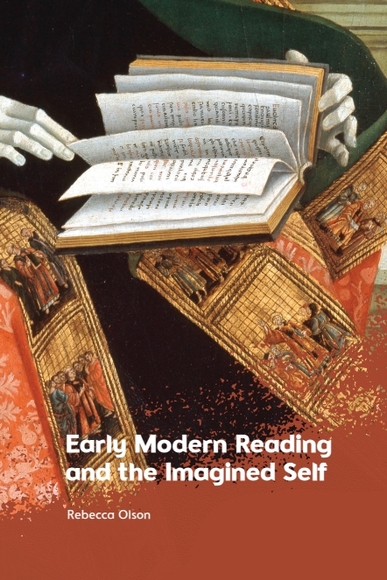
by Rebecca Olson

Early Modern Reading and the Imagined Self showcases how the Tudor printed edition can help us to relearn our assumptions about, and imagined relationships with, the ideal readers of early modern fiction.
For centuries people across cultures have engaged in practices believed to deflect envy and the envious evil eye. Rooted in the belief that prosperity is a limited resource and that one person’s advantages therefore threatens your own, envy can pose a dangerous threat to its object. To protect themselves, people developed a variety of apotropaic rituals and objects, including hand gestures and talismans, some of which are still in use today.
Envious Readers: Early Modern Haters
In early modern England, one such anti-envy practice was found in a surprising place: the prefaces to printed books. Many dedications in sixteenth- and seventeenth-century texts assert their resistance to envy or disavow any intent to provoke envy. A famous example opens Ben Jonson’s poem in Shakespeare’s First Folio (1616): “To draw no envy (Shakespere) on thy name / Am I thus ample to thy book and fame.”[1]
But in many direct addresses to audiences, readers are told to take it upon themselves to avoid reading enviously: to avoid reacting to the text in a way that is begrudging or hostile. In the prefatory “To the Reader” in Charles Gibbon’s The Praise of a Good Name (1594), for instance, we are told: “There are no greater enemies to any forward enterprise than Envy and Ignorance: for as one of malice will not so the other of simpleness cannot, give learning her due.”[2] Here, the envious are a problem not because they cannot appreciate learnedness, but rather because they choose not to.
In other texts, like Edmund Spenser’s Shepherd’s Calendar (1579), a specific individual is asked for protection from envy: “I pray you Sir, if Envy shall stir up any wrongful accusation, defend with your mighty Rhetoric and other your rare gifts of learning, as you can, and shield with your good will, as you ought, against the malice and outrage of so many enemies.”[3] Like the apotropaic symbols depicted at Roman doorways, these prefatory references to envy seem designed to keep it from getting past the book’s threshold. This was no doubt a practical move, since many authors depended on patronage: friendly readers ensured a good reputation and high sales.
Envy’s Threat to Commonwealth
At the same time, the prevalence of envy in these texts reflects the period’s understanding that how we feel about fellow readers is highly political. In early modern England, envy was seen as a threat to national prosperity: it was risky to be the envy of other nations, who might consequently attempt to conquer, but there was also risk that envy would cause social instability from within. Furthermore, envy threatened the early modern fantasy of commonwealth, which required citizens to see themselves as sharing resources and advantages. The existence of envy in the commonwealth revealed the inequities actually experienced by its members; as Sianne Ngai explains, envy is an “antagonistic response to a perceived inequality.”[4]
One problem with rejecting envy, though, is that it can leave you less capable of compassion. This idea can be found in John Dolman’s 1561 translation of Cicero: “For if a wise man might feel grief, then might he feel also pity, and envying. For pity and envy go together. For who so ever is sorry, for some man’s adversity, he may likewise envy some other’s prosperity.”[5] In other words, envy and pity are potential outcomes of putting yourself in someone else’s shoes: when we adopt another’s perspective and find it less privileged than our own, we can experience pity, and when we do so and feel ourselves to be less privileged, we might experience envy. But as Cicero makes clear, we cannot regret someone else’s adversity without simultaneously making ourselves vulnerable to envy. To reject the envious reader is to strengthen the commonwealth, but does it make it harder to feel compassion for those the nation fails?
The prefatory envy convention offers suggests that some early modern people recognized the print medium as well suited for enhancing the commonwealth, not only because print could widely disseminate information and thus make knowledge “common,” but also because engagement with books provided an opportunity for individuals to perform attitudes and practices that sustained the fantasy of commonwealth. In stronger terms, the cumulative effect of the envy convention was that it empowered readers to first invent, and then distance themselves from, attitudes—and people—that threatened to expose the failings of the commonwealth ideal.The preface to the reader may not be one of the more obvious indications of an early modern colonizing imperative, but in fact its conventional construction of envy offers an example of how one seemingly benign cultural product could be complicit in larger efforts to subjugate difference in many forms.
[1] The First Folio of Shakespeare, ed. Charlton Hinman (New York: Norton, 1968), 9.
[2] The Praise of a good name The reproach of an ill name (London: John Windet for Thomas Gosson, 1594), Sig. B1r. Spelling modernised.
[3] The Yale Edition of the Shorter Poems of Edmund Spenser, ed. William A. Oram et al. (New Haven: Yale, 1989), 20. Spelling modernised.
[4] Ugly Feelings (Cambridge: Harvard, 2005), 35.
[5] Those fyue questions, which Marke Tullye Cicero, disputed in his Manor of Tusculanum (London: Thomas Marshe, 1561), Sig. O2v. Spelling modernised.
About the author

Rebecca Olson is Professor of English at Oregon State University, and the author of Early Modern Reading and the Imagined Self (Edinburgh UP, 2025) and Arras Hanging: The Textile That Determined Early Modern Literature and Culture (U of Delaware P, 2012).





